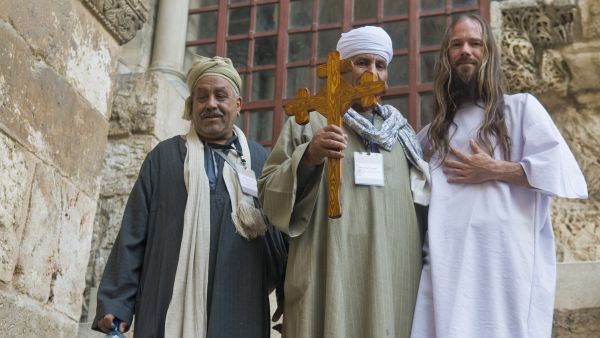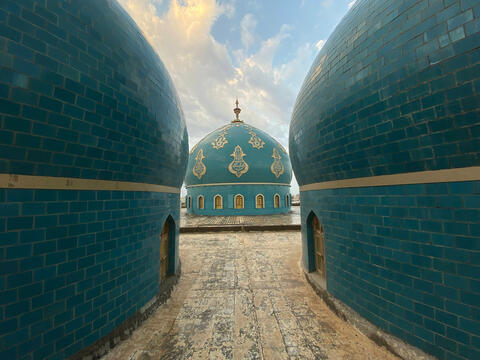By Farzad Ramezani Bonesh
Egyptian Coptic Christians have roots in the country’s history. Coptic Christians are estimated to make up 10 percent to 25 percent of Egypt's population of 106 million. Many Coptic intellectuals believe that Coptic culture originated mainly from pre-Christian Pharaonic culture.
In the fifth century AD, the Coptic Orthodox Church retained its independence. Coptic is also the religious language of the indigenous churches of Egypt, but at the end of the seventeenth century it was slowly replaced by colloquial Egyptian Arabic.
Copts are scattered in the cities and different social classes. They are also involved in many jobs such as banking, trade and government services. For example, the presence of Copts in the army since 1952 is significant. But an important part is still present in rural communities.
Since the 1970s, violence against Copts and churches, violent tensions, anger over the founding of a new church, the killing of followers of one religion by other members, and so on, have caused tensions. This made Egypt vulnerable in front of Salafi fundamentalism.
However, over the centuries we have witnessed a policy of tolerance between Egyptians, including Muslims and Copts. But extremist groups spread their version of Islam. This led to further radicalization and Muslim-Coptic conflicts. So, many Christians feel they were marginalized in Egypt during the time of President Sadat.
Tensions and extremism have led to some of Egypt's worst sectarian violence, with the bombing of the Church of Alexandria in early 2011 killing scores of Copts. In fact, a wave of violence by Muslim fundamentalists and hardline Christians provoked reactions from government officials and foreign governments.
Coptic extremists believe they suffer from systematic discrimination, they are less likely to hold public office positions, and the country’s laws discriminate against Christians. Although the Egyptian government believes that there is no targeted persecution of Copts, the role of the government in increasing tensions between Muslims and Christians in Egypt over the past few decades is important.
Some believe that the main reason behind the deepening of the gaps since 1970 is the weakness and inability of the Egyptian government to control society and, conversely, the strength of social groups in Egypt. In fact, many Copts have already left Egypt, and more than 18% now live outside the country.
A group of about 1 to 2 million Egyptian Copts outside Egypt (Coptic Diaspora) who are Coptic extremist groups, are trying to create ground for increasing divergence between the Coptic minority and the Muslim majority by the plan of autonomy and even independence. In contrast, some Egyptian parties and groups have a pessimistic view toward the Copts and consider them as the fifth pillar.
Islamic Groups and Copts
Today, the majority of Copts have accepted that they are descendants of the Pharaohs and are not Arabs, but they are the main people of the land. This is despite the fact that Salafism has practically grown in Egyptian society over the past decades, with the export of extremist and Salafi ideas to Egypt. In fact, the extremist and Salafi extremist current has had a negative view toward the Copts in Egypt. At the end of the 1990s, Egypt became the battleground for the Copts and their Western leanings, and for the Salafi Muslim tendencies and their Arab networks.
In fact, moderate Muslims and Sufis seem to have closest ties to the Copts, while Egyptian Christians do not have a very optimistic view toward the Muslim Brotherhood in Egypt. In the July 2013 developments and the clashes between the army and the supporters of Mohamed Morsi, there were widespread attacks on Coptic by supporters of the Muslim Brotherhood. The Muslim Brotherhood blamed the Copts. The August 2013 attack on hundreds of churches and religious sites were the biggest attacks in modern Egyptian history.
On the other hand, ISIL has targeted Copts in recent years and massacred more than a dozen people. As of February / April 2017, dozens of Coptic families have fled North Sinai following numerous Coptic killings. ISIS is inciting sectarian strife in Egypt between Muslims and Christians by inciting the Copts. In this regard, ISIS called on "lonely wolves" to target the Copts and their churches.
However, in recent years, Al-Azhar, (as the most important Islamic intellectual and religious center in Egypt), has tried to be the source of much dialogue and interaction between the two sides with the concurrence of Egyptian Muslim and Christian religious officials (joint presidency of Al-Azhar and the Coptic Church).
The relationship between the government and the Copts
Anwar Sadat (president of Egypt), has previously accused the Coptic Church of pursuing a Christian state in southern Egypt, receiving weapons and training from the Flans. Therefore the effort of the church was called as a state within a state. However, the relationship between the government and the Coptic Church has had its ups and downs over the past few decades.
During the rise of the Muslim Brotherhood, Christians considered themselves second-class citizens in the Islamic State. The first parliamentary elections after Mubarak (2011-2012) frightened the Coptic community. In fact, Islamist parties won about 76 percent of the seats. This concern caused the citizens and the Coptic Church to play an important role in the subsequent developments in the overthrow of Morsi.
The Pope supported the military intervention against Morsi and Morsi supporters openly blamed the Copts for his removal.
The relationship between the Egyptian government and Egyptian Coptic Churches has been improving since 2013 under the leadership of Abdel Fattah al-Sisi.
Al-Sisi took important steps to improve the relationship between the government and the Copts by visiting the cathedral, attending important church celebrations, supporting the construction of the largest cathedral, crippling severe and discriminatory regulations, and establishing a high-level committee to fight sectarianism. So, the new law on the construction of the church was passed in August 2016, and it was welcomed by Pope Tawadros II.
The relationship between the government and the Coptic Church was strengthened in December 2018, with Theodore II announcing his support for an amendment to the Egyptian constitution. Tawadros II, meanwhile, has publicly spoken out against protests by Coptic diaspora groups protesting sectarian violence in Egypt. And on January 8, 2021, Pope Tawadros II rejected the term ‘persecution’ of Copts in Egypt.
In addition, the Coptic Church is supporting the ‘Dignified Life’ project (part of the ‘Egypt’s Vision 2030’), while the government is working to strengthen security measures throughout Egypt and during Christian ceremonies, to help make them more secure.
Vision:
The Egyptian Coptic Church has become an important political player in the political arena and its role has significantly increased. However, there is a degree of Salafi-Coptic tension in society, and the process of replacing private services based on religion has become normal, which has led to the creation of a divided social space.
But the efforts of the three sides of the church, Al-Azhar and the government can be a step towards reconciliation and convergence and opposition to the approach of ISIL and extremist groups in Egypt. In this regard, steps such as the presence of Copts in the opening and reconstruction of the new mosque, with prayers for national unity and tolerance and the transfer of land for the construction of the church can increase the scope of Muslim-Christian coexistence in Egypt.
What is clear is that as much as the gap between Muslims and Coptic Christians in Egypt widens, its impact on the various economic, political and security aspects of Egyptians in Egypt will become more apparent.









